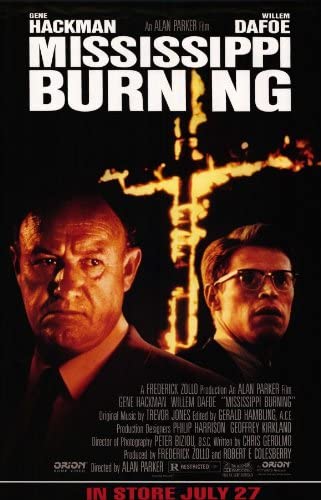Mississippi Burning (1988)
Mississippi Burning is American biographical crime thriller who released on December 2, 1988 (Washington). This 128 minutes movie tells about two FBI agents Gene Hackman as Agent Rupert Anderson and Willem Dafoe as Agent Alan Ward investigating the murder of civil rights by Ku Klux Klan workers in the 1960s are trying to break the silence conspiracy in a small southern town where the black-and-white separation divides, based on The 1964 Murders of Chaney, Goodman, and Schwerner. It also starring
- Frances McDormand as Mrs. Pell
- Brad Dourif as Deputy Sheriff Clinton Pell
- R. Lee Ermey as Mayor Tilman
- Gailard Sartain as Sheriff Ray Stuckey
- Stephen Tobolowsky as Clayton Townley
- Michael Rooker as Frank Bailey
- Pruitt Taylor Vince as Lester Cowens
- Badja Djola as Agent Monk
- Kevin Dunn as Agent Bird
Contents
Plot
Mississippi Burning was set up in 1964 when three civil rights workers were murdered in a small town by members of the Ku Klux Klan. The two FBI agents, Willem Dafoe plays Ward, a zealous Harvard graduate who has received a high ranking as a member of the Robert Kennedy Department of Justice. This by-the-book agent wants to draw attention to the killers by making the city the target of national media attention. Gene Hackman, in a lively Academy Award-Caliber performance, plays Anderson, a former Mississippi senator who uses his charm to gain the trust of the disgruntled wife of the Deputy Sheriff. Her evidence, he claims, holds the key to what actually happened to the three civil rights workers.
Controversy
In the movie depicts the ways in which the blacks are terrorized by lynchings, beatings, and the burning of their homes and churches in CIvil War era.[1] It also shows many appalling (and broadly accurate) incidents of racist violence, its narrative focus is on what race politics meant to white people.[2]
Pro
It also shows FBI agents under Anderson's direction throw restraint and legal procedure out the window in order to identify the killers. That makes them as barbaric and dehumanized as their racist adversaries. Mississippi Burning seeks to illustrate the kind of wild justice that is predicated on brutality that has permeated American history but is counter to the very values of human rights and individual freedoms.[3]
Roger Ebert give this one 4 stars out of 5 And no other movie I’ve seen captures so forcefully the look, the feel, the very smell, of racism. We can feel how sexy their hatred feels to the racists in this movie, how it replaces other entertainments, how it compensates for their sense of worthlessness. And we can feel something breaking free, the fresh air rushing in, when the back of that racism is broken.[4]

